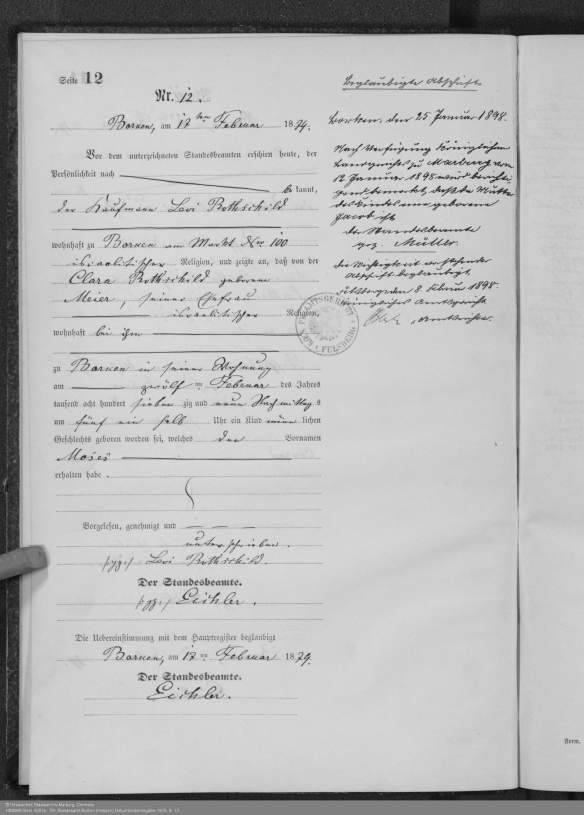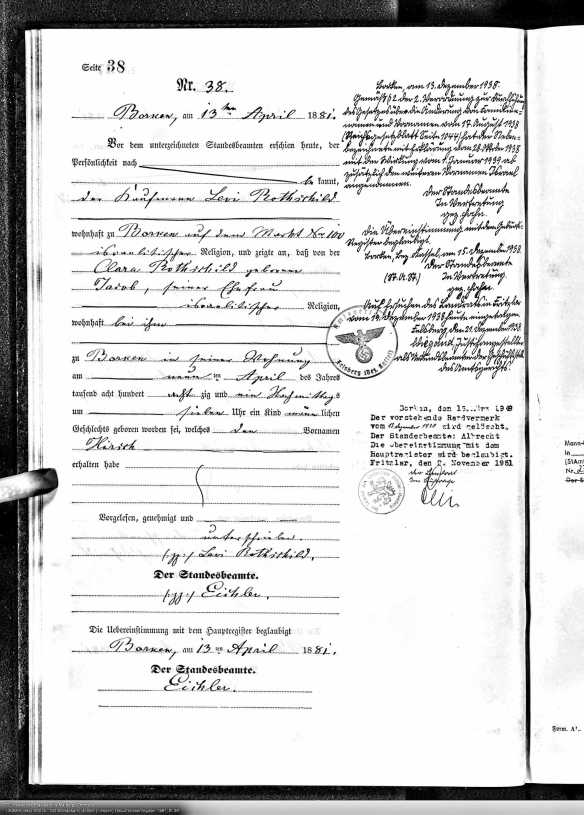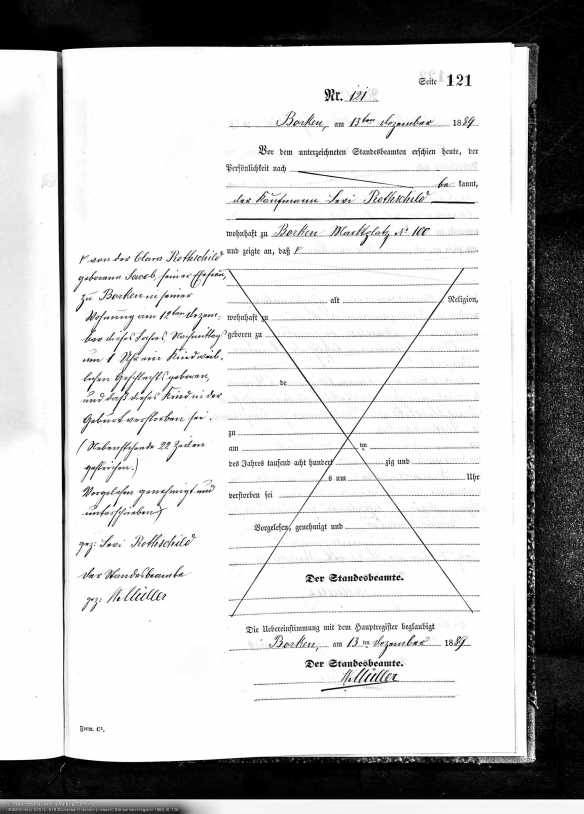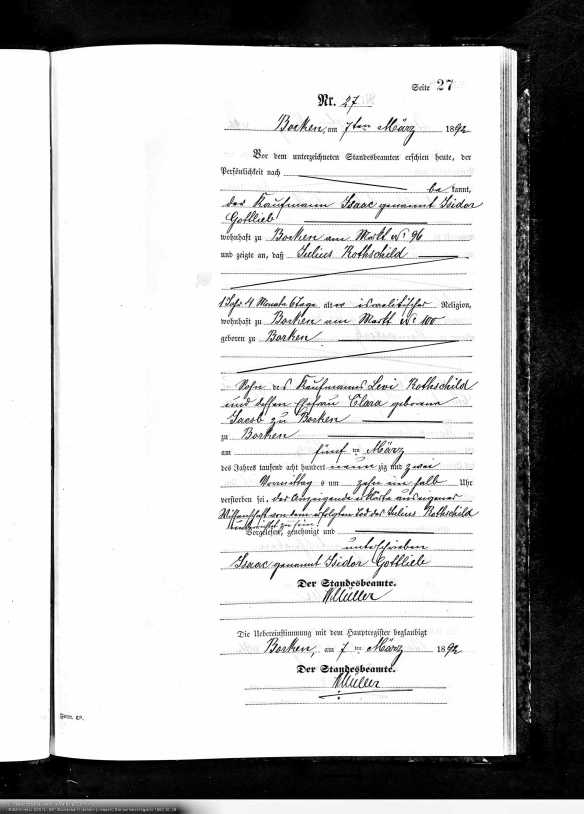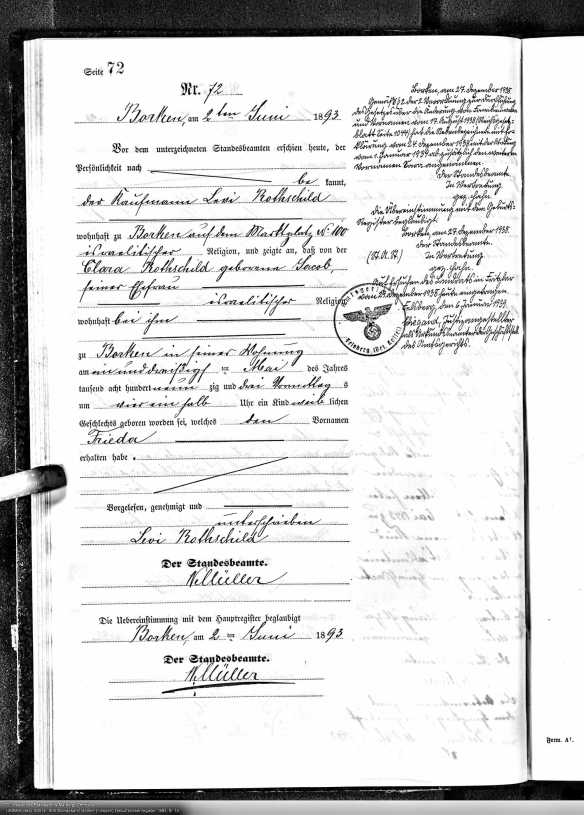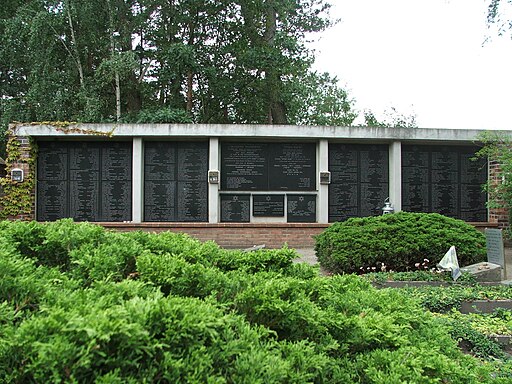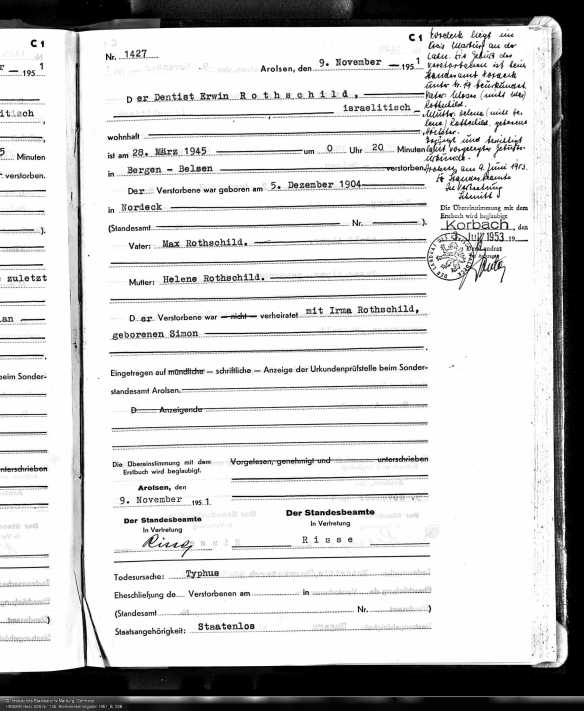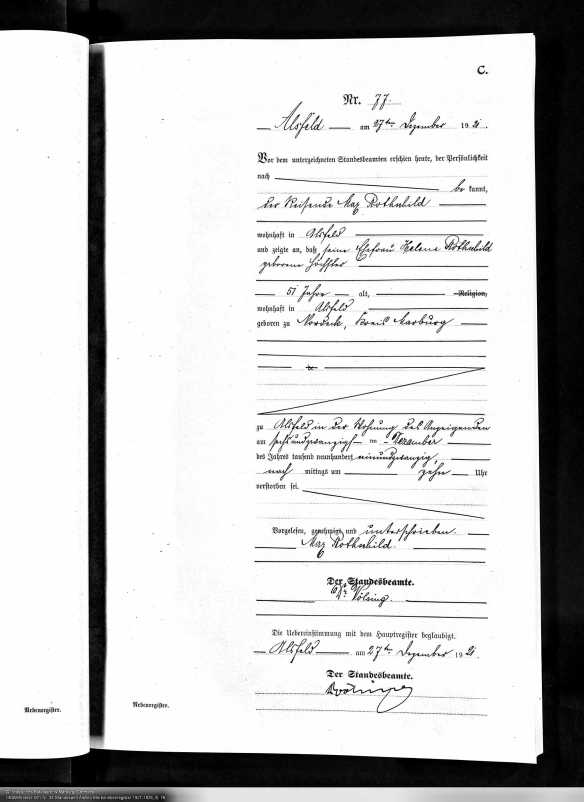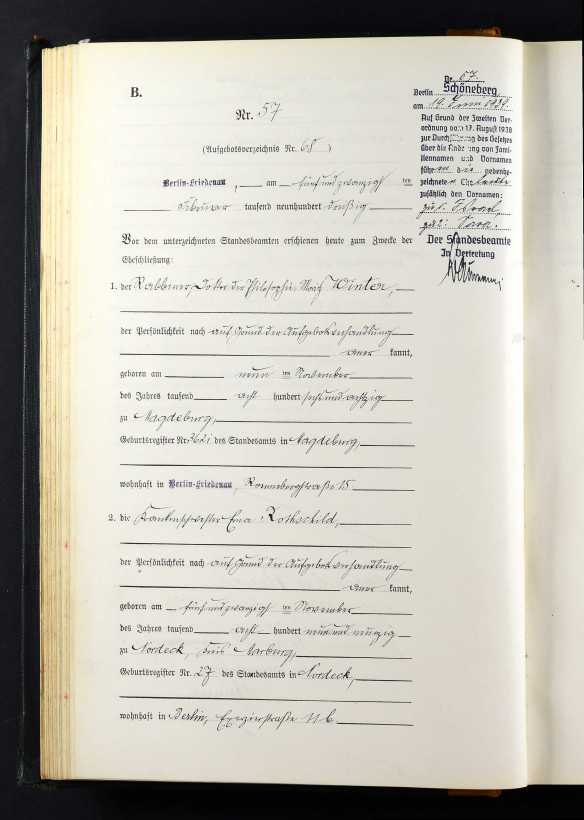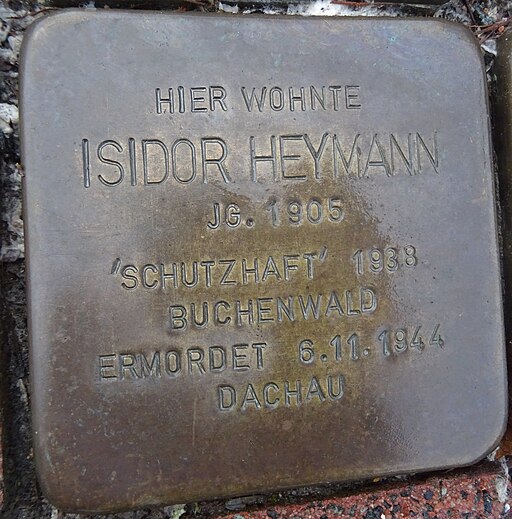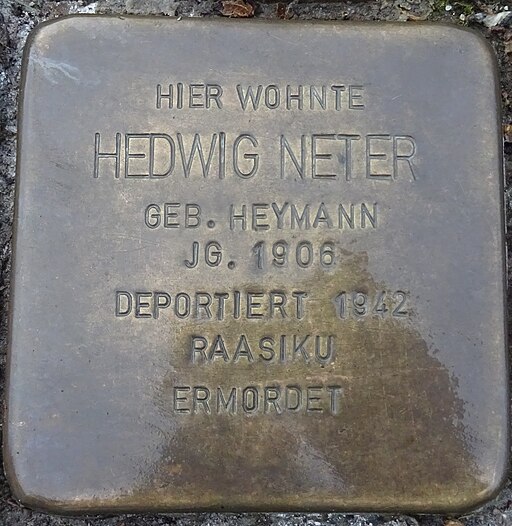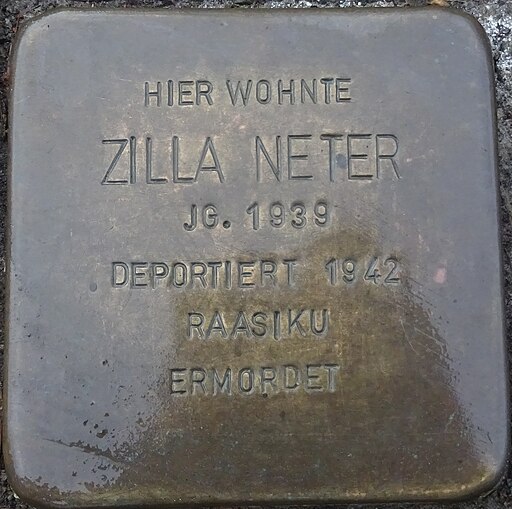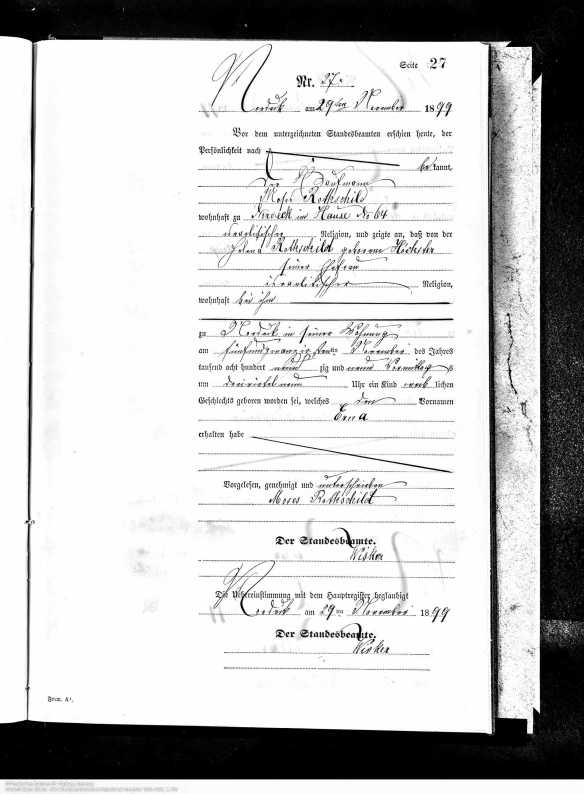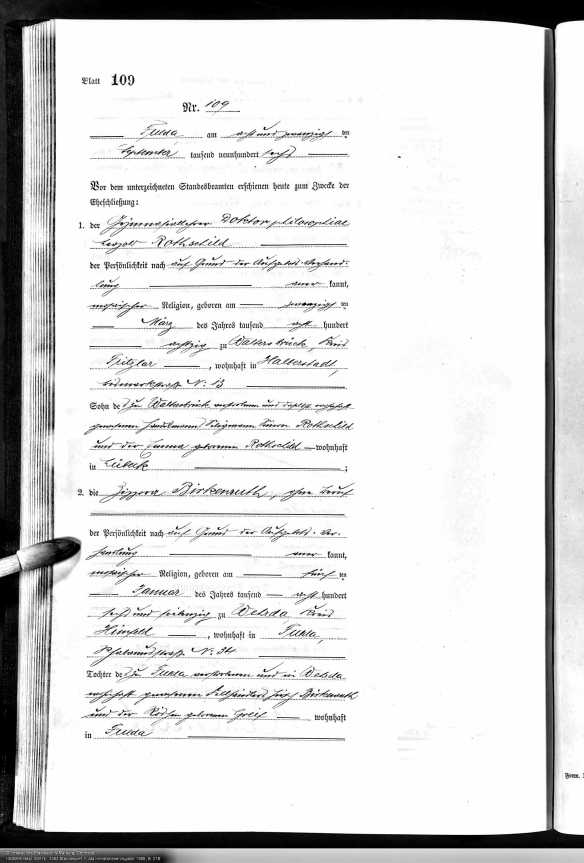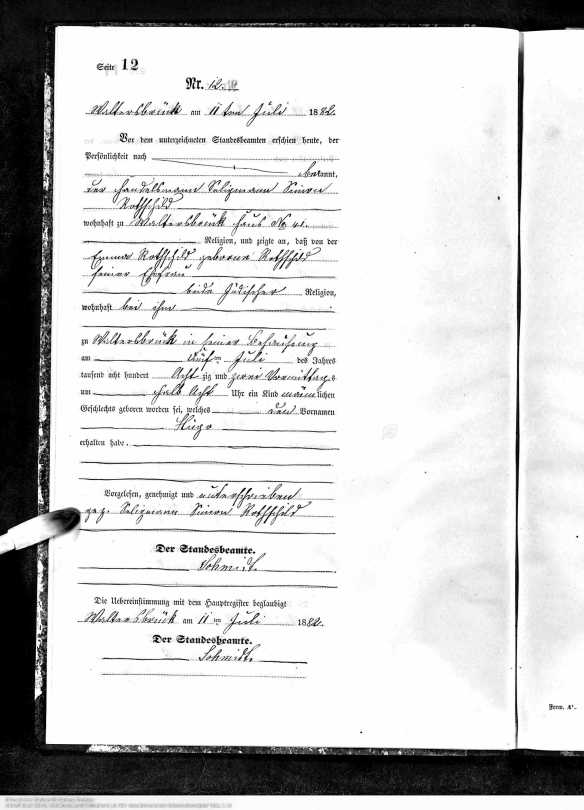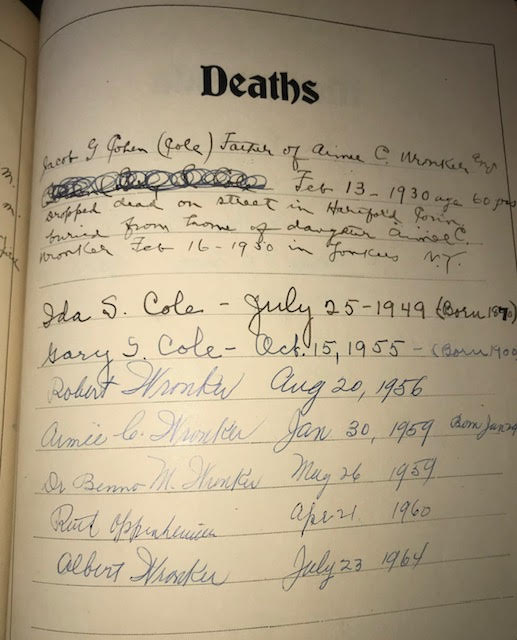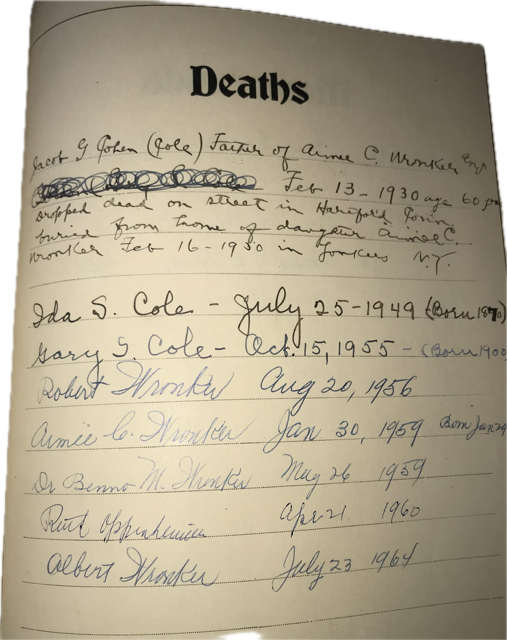Levi Rothschild’s wife Clara Jacob had given birth to nine babies, but only six of those children survived to adulthood: Sigmund, Betty, Moses, Hirsch, Thekla, and Frieda. All six of them married and had children.
Sigmund Rothschild, their oldest child, married Fanni Rosenbaum on May 28, 1906, in Schluechtern, Germany. She was born on December 21, 1879, in Schluechtern to Salomon Rosenbaum and Jeannette Sondheimer.1

Sigmund Rothschild and Fanni Rosenbaum marriage record, Arcinsys Archives of Hessen, HHStAW Fonds 365 No 766, p. 101
According to an Ancestry tree that appears to belong to their granddaughter-in-law, Sigmund and Fanny had at least one child, a son Kurt Rothschild, and although I have no birth record for him because the Borken birth records online do not go up to 1910, that tree reports that he was born on March 30, 1910, in Borken. I have reached out to the tree owner and hope to get more information if she gets back to me. So far after two months I’ve gotten no response. I am not optimistic, but people have found my messages even years after I’ve sent them through Ancestry, so you never know.
Sigmund’s sister Betti Rothschild married Emanuel Hirschmann on December 21, 1898, in Borken. He was born to Loeb Hirschmann and Malchen Strauss on April 12, 1868, in Gross Krotzenburg, Germany.

Betti Rothschild and Emanuel Hirschmann marriage record, Hessisches Hauptstaatsarchiv; Wiesbaden, Deutschland; Bestand: 920; Laufende Nummer: 834, Year Range: 1898, Ancestry.com. Hesse, Germany, Marriages, 1849-1930
For many weeks I could not find records of any children born to Betti and Emanuel. And then I found the name “Walter Hirschman” as a sponsor on an immigration record for one of Betti’s siblings, Thekla, and I thought, “Maybe Walter Hirschman was related to Betti Rothschild and Emanuel Hirschmann?”

Ancestry.com. Munich, Vienna and Barcelona Jewish Displaced Persons and Refugee Cards, 1943-1959 (JDC)
Several clicks through the Hesse files and thirty minutes later I found this birth record for Walter, son of Emanuel and Betti, born in Hanau, Germany, on December 30, 1899.

Walter Hirschmann birth record, LAGIS Hessen Archives, Standesamt Hanau Geburtsnebenregister 1899 (HStAMR Best. 913 Nr. 1780)AutorHessisches Staatsarchiv MarburgErscheinungsortHanauErscheinungsjahr1899, p.323
That made me wonder whether Betti and Emanuel had had other children. Unfortunately, the Hanau birth records online only go up through 1900, and I did not find any other birth records for that couple in that year. If there were children born after 1900, I have not found any other evidence of such children.
The third child of Levi and Clara, Moses or Moritz Rothschild, married Margarete David. I don’t have a marriage record for Moritz and Margarete nor do I have birth records for their children from Germany, but I was able to track down records on the Israel Genealogical Research Association website that helped to fill in those gaps. Margarete was born in Hagen, Germany, on May 27, 1889, to Louis David and Alwine Harff David.2 Moritz and Margarete had two children, Ruth, born October 8, 1914,3 and Herbert (later Yehuda), born December 10, 1921, in Magdeburg, Germany.4
Hirsch (also known as Harry) Rothschild, the fourth child of Levi Rothschild and Clara Jakob, married Malli (also known as Mathilda) Rosenbaum on November 29, 1909, in Schluechtern, Germany. She was the daughter of Salomon Rosenbaum and Jeanette Sondheimer and was born in Schluechtern on July 20, 1885.5

Hirsch Rothschild and Malli Rosenbaum marriage record, Arcinsys Archives of Hessen, HHStAW Fonds 365 No 766, p. 104
Harry Hirsch Rothschild and Malli Rosenbaum had three children. Gertrude was born September 3, 1910, in Gudensberg, Germany.6 Her sister Edith was born there on July 4, 1911,7 and their brother Edmund Siegfried was born one year later on July 30, 1912.8
The fifth child of Levi and Clara, their daughter Thekla, married Manuel Edward Weinberg on August 19, 1907, in Borken. Manuel was born in Lichenroth, Germany, to Lazarus Weinberg and Karoline Oppenheimer on October 11, 1880.

Thekla Rothschild and Manuel Weinberg marriage record, Hessisches Hauptstaatsarchiv; Wiesbaden, Deutschland; Bestand: 920; Laufende Nummer: 843, Year Range: 1907, Ancestry.com. Hesse, Germany, Marriages, 1849-1930
Thekla and Manuel had a son Hans Herbert Weinberg born in Frankfurt, Germany, on November 2, 1908.9
Finally, the last born of Levi and Clara’s children, their daughter Frieda, married Leopold Marxsohn on November 25, 1920, in Frankfurt. He was born on June 21, 1883, in Koenigstadten, Germany, to Abraham Marxsohn and Emilie Stern.

Frieda Rothschild Leopold Marxsohn marriage record, Hessisches Hauptstaatsarchiv; Wiesbaden, Deutschland; Bestand: 903, Year Range: 1920, Ancestry.com. Hesse, Germany, Marriages, 1849-1930
It appears that Leopold died before November 25, 1925, because on that date Frieda married Paul Phillipsohn in Frankfurt, and she is identified as a widow on their marriage record. I cannot find any death record for Leopold, however, and none of the other trees or other secondary sources have a date for his death. There is a FindAGrave entry for a Leopold Marxsohn who died in 1919 and is buried in Frankfurt,10 but that can’t be the same man unless the date on FindAGrave is incorrect. And there is a Leopold Marxsohn listed in the 1925 Frankfurt directory,11 but that also could be a different man. More exploration is necessary.
In any event, Frieda remarried as noted on November 25, 1925, and her second husband was Paul Phillipsohn. Paul was born on October 15, 1885, in Gandersheim, Germany. I have not yet found the names of his parents.

Frieda Rothschild Marxsohn and Paul Phillipsohn marriage record, Hessisches Hauptstaatsarchiv; Wiesbaden, Deutschland; Bestand: 903, Year Range: 1925, Ancestry.com. Hesse, Germany, Marriages, 1849-1930
Frieda and Paul had one child, a daughter Hannelore, born in Frankfurt on November 3, 1926.12
Thus, by late 1926, when Hannelore Phillipsohn was born, there were eight living grandchildren of Levi Rothschild and Clara Jacob. Sadly, Levi did not live to see all of them born as he had died on October 15, 1913, in Borken at the age of 67.

Levi Rothschild death record, Hessisches Hauptstaatsarchiv; Wiesbaden, Deutschland; Personenstandsregister Sterberegister; Bestand: 902; Laufende Nummer: 920, Year Range: 1913
Ancestry.com. Hesse, Germany, Deaths, 1851-1958
His wife Clara Jacob, however, lived to see all eight of those grandchildren born. She died on November 24, 1929, in Borken when she was 78 years old.

Clara Jacob Rothschild death record, Hessisches Hauptstaatsarchiv; Wiesbaden, Deutschland; Personenstandsregister Sterberegister; Bestand: 913; Laufende Nummer: 920, Year Range: 1929, Ancestry.com. Hesse, Germany, Deaths, 1851-1958
That brings us to the decade of the 1930s, and as you may expect, the lives of all six of Levi and Clara’s children, their spouses, and their children were drastically changed during that decade and the one that followed.
- Fanni Rosenbaum birth record, Hessisches Hauptstaatsarchiv; Wiesbaden, Deutschland; Bestand: 913; Signatur: 5881, Ancestry.com. Hesse, Germany, Births, 1851-1901 ↩
- Margarete Sara Rothschild, [Margarete Sara David], Birth Date 27 Mai 1889 (27 May 1889), Birth Place Hagen, Last Residence Magdeburg, National Archives and Records Administration (NARA); Washington, DC; Name Index of Jews Whose German Nationality Was Annulled by the Nazi Regime (Berlin Documents Center); Record Group: 242, National Archives Collection of Foreign Records Seized, 1675 – 1958; Record Group ARC ID: 569; Publication Number: T355; Roll: 7, Mosbacher, Eduard – Schafranek, Bruno, Ancestry.com. Germany, Index of Jews Whose German Nationality was Annulled by Nazi Regime, 1935-1944. Also, Registration form for Margarete David Rothschild reporting to the German Embassy Legation at the German Consulate General Consulate Bizekonsult in Jerusalem, A-B (טפסי הרשמה: A-B), part of the Residents 1938-1939 (תושבים 1938-1939) database, system number פ-500/5, IGRA number 1459. The original records are from Israel State Archives (ארכיון המדינה), and found at the IGRA website. See also this Wikipedia article about Margarete’s brother Ferdinand and his life. ↩
- Registration form for Ruth Rothschild reporting to the German Embassy Legation at the German Consulate General Consulate Bizekonsult in Jerusalem, A-B (טפסי הרשמה: A-B), part of the Residents 1938-1939 (תושבים 1938-1939) database, system number פ-500/5, IGRA number 1465. The original records are from Israel State Archives (ארכיון המדינה), as found at the IGRA website. ↩
- Yehuda Rothschild marriage record, Marriage/Divorce Certificates (תעודות נישואין / גירושין), part of the Marriages and Divorces 1921-1948 Palestine British (נישואין וגירושין 1948-1921 ארץ ישראל) database, document number 91714, IGRA number 507. The original records are from Israel State Archives (ארכיון המדינה), as found at the IGRA website. ↩
- Malli Rosenbaum birth record, Hessisches Hauptstaatsarchiv; Wiesbaden, Deutschland; Bestand: 913; Signatur: 5887, Ancestry.com. Hesse, Germany, Births, 1851-1901 ↩
-
Gertrude Rosbasch, [Gertrude Rothschild], Gender Female, Birth Date 3 Sep 1910, Birth Place Gudensberg, Death Date 4 Jul 1997, Claim Date 17 May 1973, Father
Harry Rothschild, Mother Mathilde Rosenbaum, SSN 054385223, Ancestry.com. U.S., Social Security Applications and Claims Index, 1936-2007. ↩ - Edith Miriam Solomon, [Edith Miriam Rothschild], Gender Female, Race White, Birth Date 4 Jul 1911, Birth Place Gudensberg, Federal Republic of Germany, Death Date 28 Jul 2003, Claim Date 19 Jan 1976, Father Harry Rothschild, Mother Mathilde Rosenbaum, SSN 071180622, Ancestry.com. U.S., Social Security Applications and Claims Index, 1936-2007. ↩
-
Edmund Siegfried Rothschild, Gender Male, Race White, Birth Date 30 Jul 1912
Birth Place Gudensberg, Federal Republic of Germany, Death Date 21 Apr 1994
Father Harry Rothschild, Mother Mathilda Rosenbaum, SSN 114342498, Ancestry.com. U.S., Social Security Applications and Claims Index, 1936-2007. ↩ -
Hans Herbert Weinberg, Gender männlich (Male), Record Type Inventory, Birth Date 02 Nov 1908 (2 Nov 1908), Birth Place Frankfurt am Main, Last Residence Frankfurt am Main, Residence Place Frankfurt am Main, Father Edmund Weinberg
Mother Thekla Weinberg, Spouse Edith Seckbach, Arolsen Archives, Digital Archive; Bad Arolsen, Germany; Lists of Persecutees 2.1.1.1, Ancestry.com. Free Access: Europe, Registration of Foreigners and German Persecutees, 1939-1947 ↩ - Find a Grave, database and images (https://www.findagrave.com/memorial/130472657/leopold-marxsohn: accessed April 8, 2024), memorial page for Leopold Marxsohn (unknown–1919), Find a Grave Memorial ID 130472657, citing Alter Jüdischer Friedhof, Frankfurt am Main, Stadtkreis Frankfurt, Hessen, Germany; Maintained by Athanatos (contributor 46907585). ↩
- Deutsche National Bibliothek; Leipzig, Deutschland; Publisher: Scherl; Signatur: ZC 811; Laufende Nummer: 1, Ancestry.com. Germany and Surrounding Areas, Address Books, 1815-1974 ↩
- Arolsen Archives, Digital Archive; Bad Arolsen, Germany; Lists of Persecutees 2.1.1.1, Reference Code: 02010101 oS, Ancestry.com. Free Access: Europe, Registration of Foreigners and German Persecutees, 1939-1947; Find a Grave, database and images (https://www.findagrave.com/memorial/109408821/hannelore-philippsohn: accessed April 8, 2024), memorial page for Hannelore Philippsohn (3 Nov 1926–unknown), Find a Grave Memorial ID 109408821; Burial Details Unknown; Maintained by IWPP Custodial Account (contributor 48586138). ↩







